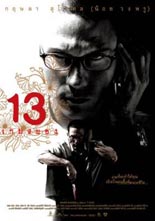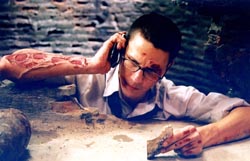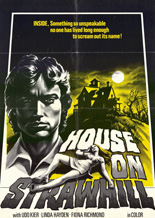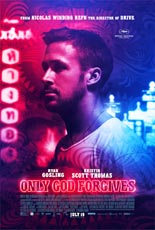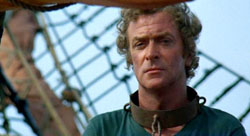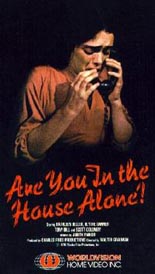
 Are You in the House Alone?! is the question posed over the phone to straight-A student Gail Osborne (Kathleen Beller, The Sword and the Sorcerer) while babysitting. While anonymous and unsettling, the connection is not as iconic as the one a year later When a Stranger Calls, asking Carol Kane if she’s checked the children.
Are You in the House Alone?! is the question posed over the phone to straight-A student Gail Osborne (Kathleen Beller, The Sword and the Sorcerer) while babysitting. While anonymous and unsettling, the connection is not as iconic as the one a year later When a Stranger Calls, asking Carol Kane if she’s checked the children.
The tele-terror is merely one piece of a multitiered plan of harassment from an unknown admirer/stalker who also places threatening notes in Gail’s school locker. It puts the damper on a burgeoning romance between her and new beau Steve (Scott Colomby, the Porky’s saga), who is disliked by Gail’s high-strung mother (Blythe Danner, Meet the Parents) for breaking curfew. Worse, the badgering escalates into rape. I didn’t spoil anything, either; director Walter Grauman (Paper Man) does that in the first scene before segueing into an hour-long flashback.
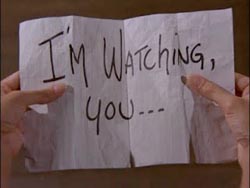 This being the late 1970s, it’s suggested that Gail’s case against her attacker is a losing proposition due to her not being a virgin — an attitude every bit as dated as the atrocious hairstyles and fashions on display.
This being the late 1970s, it’s suggested that Gail’s case against her attacker is a losing proposition due to her not being a virgin — an attitude every bit as dated as the atrocious hairstyles and fashions on display.
For being made for television, Are You in the House Alone?! does a fair job of building some suspense, but once the narrative circles back to the beginning, it makes a complete tonal shift from thriller to drama — and not just a drama, but one with an overly moralizing Afterschool Special feel. Viewers practically can see the seeds of many of a Lifetime movie being planted before their eyes; ultimately, the pic is most notable for giving Dennis Quaid one of his earliest roles. —Rod Lott

